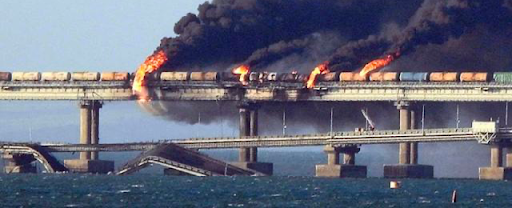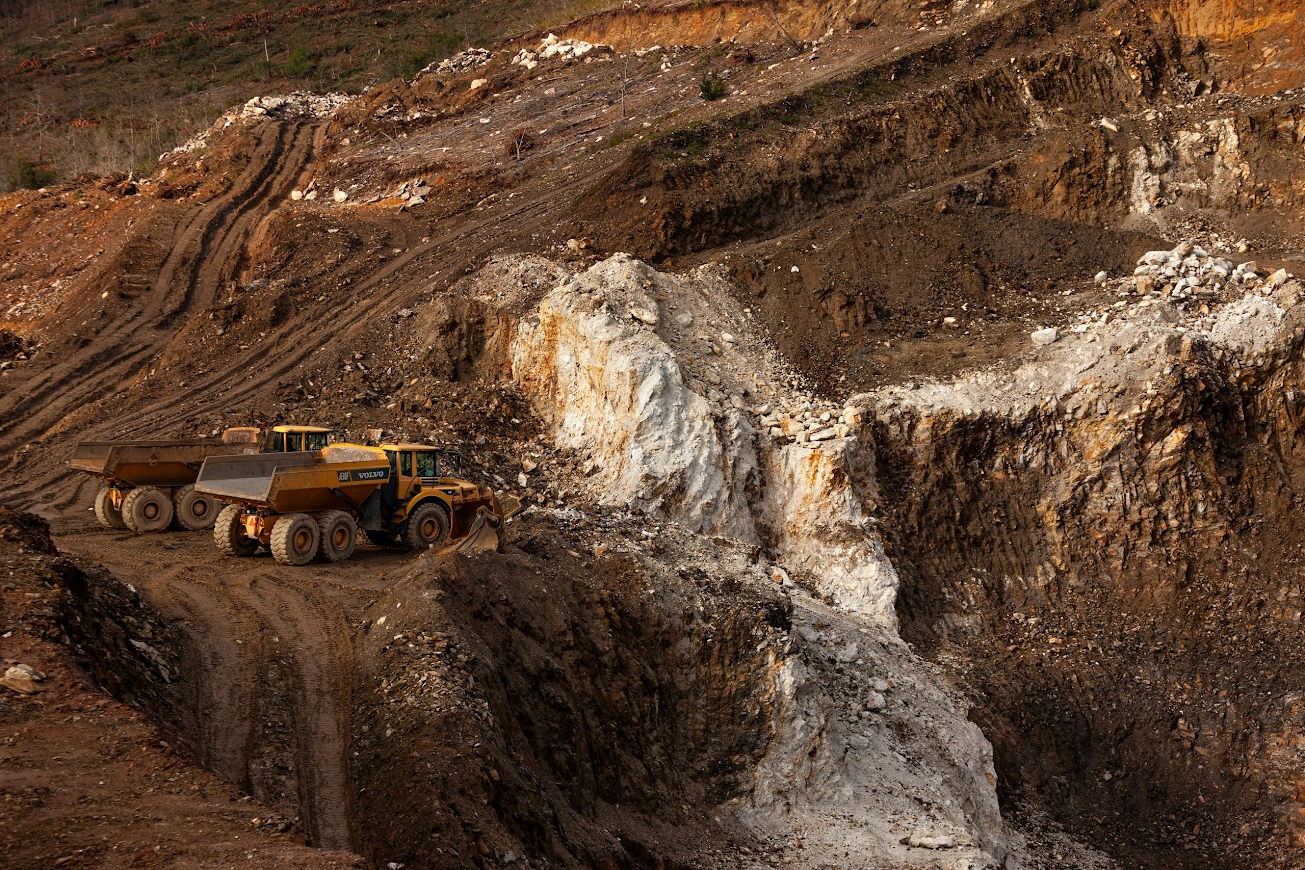06/05/2024
Nearly a year ago, in July 2023, the last attack occurred on the illegally constructed Crimean Bridge by the Russians. Propagandists claimed that the crossing would be repaired within 2-3 months. However, Molfar analysts, after analyzing satellite images, can confirm that the Russians are not transporting military cargo via the railway section of the bridge. This fact is why attacking the Crimean Bridge now makes no sense. The Russians have found alternative ways to transport military cargo, which seem to be functioning already. Read more about this in the article.
Russian military trains halted on the Crimean bridge
According to the analysis of Maxar satellite images, Molfar analysts examined two periods: from May 2023 to September 2023 and from February 2024 to April 2024. From May to September 2023, freight and passenger trains traveled over the railway section of the bridge. The only instance where military equipment was spotted occurred in July 2023, when freight trains and platforms with military equipment were seen at the Taman station, which will be discussed later in the article.
The chart above displays Molfar analysts' calculations of the proportions of different types of railcars that crossed the Crimean Bridge from May 2023 to March 2024. These data are based on analyzing satellite images, railcar counts, and cargo identification.
As we can see, from February to April (with the most recent satellite images taken on April 14, 2024), no freight trains carrying military equipment were observed on the railway section of the bridge. However, in February 2024, a freight train with around 55 cars carrying fuel tanks passed over the Crimean Bridge.
During these two periods, a concentration of freight railcars was observed at Taman Station in the Rostov region of Russia. The total number of detected freight cars was 1,097 units, while 203 freight cars were known to have crossed the Crimean Bridge. This may indicate a reluctance on Russia's part to transport military cargo via the bridge after previous attacks and the use of alternative routes.
This chart displays the number of railcars at Taman Station heading towards the Crimean Bridge. Military cargo was recorded only once, in July 2023. Since the 2023 attack, no trains with military cargo have been observed at Taman Station heading toward the Crimean Bridge. Additionally, the number of freight trains has been reduced by more than half.
The movement of Russian military trains on the Crimean Bridge has been stopped as a result of last year's effective attack
As a result of the attack on the illegal Kerch crossing in July 2023, bridge support was destroyed. The explosion damaged both sections of the bridge — the roadway and the railway segment.
Later, the Security Service of Ukraine (SBU) released a video of the strike. At least one "Sea Baby" drone struck the bridge support. CNN journalists noted that the strike hit the railway section precisely. After the attack, the Russians claimed that the bridge would be repaired in 2-3 months. Once the road was repaired, traffic resumed but with restrictions. The maximum weight of vehicles allowed to cross the bridge was set at 3.5 tons.
According to the Security Service of Ukraine head Vasyl Maliuk, "before the shelling of the bridge, 42 to 46 trains carrying weapons and ammunition crossed daily, but now it's 4-5: four for passenger transportation and one for general goods."
Molfar analysts reviewed satellite images across two periods. The first was from May 2023 to September 2023. During this period, freight and passenger trains crossed the railway section of the bridge. The only instance when military equipment was observed was in July 2023.
The second period covered images from February 2024 to April 2024. In March-April 2024, no freight trains carrying military equipment were detected on the railway section of the bridge.
In February 2024, only one freight train (approximately 55 cars) carrying fuel tanks crossed the bridge (satellite image above). The train was 820 meters long with about 55 railcars. We could not confirm the presence or absence of military equipment on this train.
Below is a collage of several satellite images illustrating the situation on the Crimean Bridge before the attack. For clarity, we've included photos from June and July 2023.
Satellite images of traffic on the Crimean Bridge before the July 2023 attack:
Analysis on the territory of Crimea and directly on the bridge:
During both analyzed periods, freight railcars accumulated at Taman Station. Their total number reached 1,097, while the number of railcars crossing the Crimean Bridge was only 203. This suggests a reluctance on Russia's part to transport military cargo via the Crimean Bridge.
Sky, Sea, and Occupied Mariupol: The Occupiers' New Pathways
In the war, Russia relies heavily on rail transport and actively uses it in its war against Ukraine. Specifically, they are rapidly constructing new routes in the occupied territories, thereby connecting annexed Crimea with Russian territory.
In November 2023, reports indicated the Russians were constructing a railway from Akimivka to Berdyansk. This route extends to Mariupol and then on to Rostov. The railway is single-track and lacks electric traction, since electrical networks are vulnerable to shelling. Construction began near occupied Donetsk.
According to sevastopol.su, the first freight trains traveled along the new route In March 2024. The first stage of the project includes 63 km of new tracks and 140 km of restored tracks. Two more stages, which will include track junctions and the construction of station offices, are planned for completion by the end of 2024.
Eventually, the Russians launched the first train on this railway in the occupied part of Donetsk Oblast. According to Mariupol mayoral advisor Petro Andriushchenko, the first train departed from the port of Mariupol to the Volnovakha railway station. The Times journalists suggest that this new route is being prepared for a Russian offensive against Ukraine in 2024.
Russia's plan is to connect the occupied Crimea via a land-based railway corridor through the newly seized territories of Ukraine. A diagram published by *The Times* highlights several key railway junctions. The railway intended to connect occupied Donetsk with Sevastopol and Rostov-on-Don is marked in orange. In blue, a few additional branches connect the occupied cities of Berdiansk and Mariupol.
A second alternative option is the highway.
The Russians can transport cargo using an alternative land route through temporarily occupied territories.
The Russians themselves report high-quality road conditions on the route through the occupied territories to Crimea. As of April 2024, this land route accounts for up to half of the cargo transport, nearly as much as the Crimean Bridge.
The third alternative is ferries.
Ferries began to be used the day after the attack on the bridge in the summer of 2023. The ferry crossing takes about 30 minutes. There are also reports that landing ships were used as ferries. Ferries primarily transport military vehicles and buses (1, 2).
The fourth alternative is airplanes.
The Russians mainly use the military airfield in Dzhankoi, which has become a key logistics hub for operations in southern Ukraine. Su-25 aircraft often carry out combat missions from there and transport military personnel or equipment to the occupied territories. Military transport aircraft also make regular flights to other airfields in occupied Crimea, such as Belbek and Hvardiiske.
What's being transported across the Crimean bridge now?
A propagandist from the "Russia 1" channel frequently films videos about the Crimean Bridge. In one of these videos (from April 9, 2024), a military truck is visible, driving from the direction of occupied Kerch.
_1714979828.png)
According to comments from January 30, 2024 (1, 2), humanitarian cargo cannot pass through the bridge. The truck captured in the video is likely military. Such trucks may be used by Russians to transport personnel or military cargo, such as ammunition crates or military equipment.
Thus, as of 2024, the bridge will likely be used to transport minor military cargo, while the railway is not being utilized in this regard.
A blogger on YandexDzen published a video that may have been recorded in March or April 2024. It shows a freight train (22 cars) and two passenger trains (17 and 6 cars) traveling across the bridge. The video was likely filmed from the occupied side of Kerch (Google Maps). Another video (1, 2) was filmed from a passenger train, likely in March 2024.
John Kirby, the spokesperson for the U.S. National Security Council, stated that the Crimean Bridge now has more of a symbolic significance for Russia after the attack in July 2023. The damage to the railway support made the bridge nearly unsuitable for transporting large military cargo by rail. This is a significant achievement for Ukraine. And it appears that there is really no need for a repeated attack on the Crimean bridge right now. And even if we will attack the bridge now, are we sure of repeating the success of the previous operation?
However, the Russian military adapted and found alternative routes that were just as effective. Russia uses rail transport for military cargo, but not via the Crimean Bridge as before; instead, it routes through the mainland and newly occupied territories of Ukraine. And it is these paths that are currently a more serious threat than the non-working railway path of the Crimean Bridge.




